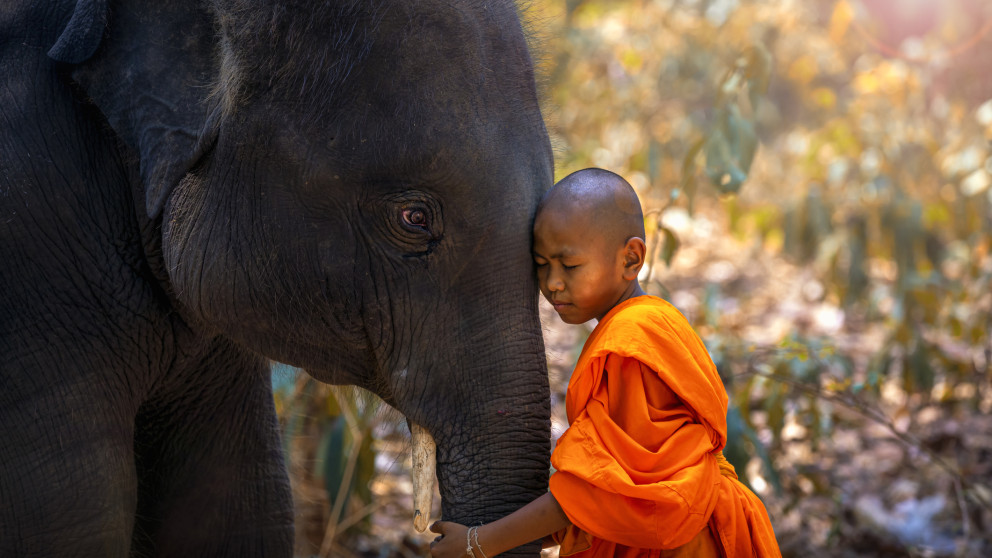Whales, Stars, and the Self: Doing Science With Tenderness
24.11.2025

A few years ago, I helped organise a conference with HH Dalai Lama on “Buddhism, Science and Compassion”. During the conference, we revisited the classical argument of the great Tibetan philosopher Tsongkhapa that in the pursuit of knowledge one mustn’t conflate the two processes: of not finding something and finding its non-existence. In today’s climate of growing scepticism toward science, this distinction is especially vital: reminding us to approach inquiry with rigor and also with humility, ensuring that the scientific method permeates public discourse thoughtfully, effectively and harmoniously.
Engaging with the scientific method, both as a teacher and researcher, I have come to respect it deeply. In theory, I hold it to be one of humanity's great achievements in intersubjectivity — a language of reason that transcends boundaries of culture, religion, and race. Yet, the more I engaged in the actual practice of science, the more I began to confront an existential tension that remains with me to this day.
Let me put it this way: behold a blue whale — a massive yet gentle being that predates Homo sapiens in evolution. Or the Methuselah pine, a tree nearly 4,857 years old. I am fully aware that neither the whale can solve a differential equation nor can the pine classify the elements in the periodic table. But I cannot summon the chutzpah to declare that these beings “know nothing” compared to us — scientifically or otherwise. A quiet discomfort lingers in my being, even if I cannot frame a precise argument for it. It is an unease akin to sitting in my office on a rainy day with wet socks — subtle, persistent, and impossible to ignore. A part of me revolts at the very thought that these ancient beings, who have witnessed countless full moons and breathed this planet’s air far longer than we have, possess no knowledge worthy of our recognition.
Undoubtedly, there are sophisticated institutes devoted to studying whales, trees, and what not. But what matters to me is the volition that drives such explorations. Are we striving to learn from these beings — approaching them with humility and wonder — or are we merely trying to scientize their existence, reducing them to “objects” of investigation? The volition with which we approach determines whether our inquiry becomes an act of communion or an act of conquest.
And herein lies the heart of the matter. Scientism arises when science is mistaken not as a method of inquiry but as a total worldview — when its tools, brilliant within their own domain, are presumed sufficient to explain every possible question, of meaning, value, or purpose. This overreach risks reducing the broad fabric of human (and non-human) experience into what can merely be measured, quantified, or experimentally verified. Instead of engaging in the graceful unfolding of truth, a practitioner of science, if heedless, may succumb to the subtle allure of condescension towards other forms of exploration — a spirit that has not only long victimized the humanities (let alone non-human beings!) until very recent years but also, perhaps is contributing towards its own distrust. This overconfidence finds one of its most enduring expressions in reductionism — the belief that understanding lies always in breaking things down, inadvertently also breaking the subject from the object, or the researcher from their human self.

Reductionism, all the way down
To understand, we isolate — but life resists isolation. As science evolved, inquiry became increasingly confined within specialized domains and rigid formalisms, abstracting away the intricate web of interconnections that binds phenomena together. Like a surgeon who drapes the rest of the body to focus on a single organ, we often narrow our gaze for precision’s sake, forgetting that the whole continues to breathe beyond our frame. While such focus yields definite success, it falters in the long term when divorced from the larger context — as the pandemic starkly revealed. The virus itself played a causal role, but not the whole story: immunity, cultural and individual beliefs, economy, and ethics intertwined in determining its course. A virus, a forest, a person — all exist within nested layers of dependence, some hierarchical and heterarchical, each leaking into the next. This interdependence is precisely why no single, totalizing theory can explain how elephants can arise from electrons, presidents from protons, or civilizations from cells, in a linear fashion. Even a retinal cell resists absolute definition (like an atom), for it belongs to an eye, which belongs to the upper body, which belongs to an individual, a community, which belongs to the Earth — an unbroken continuum of being, ad infinitum.
Causation, too, mirrors this entanglement, for it isn't solely bottom-up. It is not that only the physical has the causally potent say on this world. Top-down causation goes hand in hand with bottom-up causation. For instance, irritable bowel syndrome (IBS) can cause butterflies in the stomach as much as meeting someone we are romantically inclined towards. Even though, for instrumental purposes, we assume a causal primary (cause of all causes or focused cause) in our study, in reality we can’t find such a thing. Eastern metaphysics pronounced this insight, long ago (especially Huayan Buddhism): there is no causal centre and even if there is one, it is everywhere. So unless we engage with all levels of causality with a spirit of Bohmian inquiry, with openness, we can’t move from mere communication to genuine communion. This openness must also extend inward, to the very mind that inquires.
In our times, where researchers are already overburdened to publish continually and defend their ideas for survival, they must also contend with science deniers and policymakers who too often privilege prejudice or personal gain over reason and the common good. It is in these tiring circumstances that an acute sense of “subject-object” divide flourishes. It becomes tempting to imagine that the world is something out there — a “problem” to be fixed by us, the scientific subjects, who stand not only apart from it but, in a subtler way, apart from our own living selves. One may also assume that their mental stance — their inner well-being — resides in a separate compartment, while scientific objectivity occupies another, untouched realm of cognition. Questions such as “How does my body and mind feel when publishing a paper? What stirs within me while sitting in a conference room amid heated debate? What happens to my being when confronted by a science denier who provokes or dismisses?” are often relegated to the domain of wellness or psychology. Meanwhile, as we continue to develop ever more precise stances toward the cosmos, we assume that these subjective stirrings bear no influence on our understanding of the natural world — when, in truth, they quietly shape the very lens through which we see it.
This “problem-to-be-fixed” stance, disconnects our inquiry from our being, exhausts our curiosity thereby burning us out and prevents us from engaging harmoniously with various causal levels. For a very long time, I couldn’t come to terms with the fact that we can communicate successfully with distant stars but fail often to communicate with fellow beings and our own bodies and minds with tenderness. “Humans are more complex than stars and electrons” one may retort: all the more reason, then, for our scientific gaze to turn inward. Such reflection should not be left to psychologists or anthropologists alone; even those immersed in the abstractions of theoretical physics or computational chemistry might approach it with wonder. For what is at stake here is not a peripheral curiosity, but the most intimate inquiry of all: the study of our own nature, our own self.

The Whole Breathes too
Please pause for a moment — if you may — and gently close your eyes. Let a gentle smile blossom on your face and please reflect: When my heart is at peace and my mind unburdened by anxiety, how does the carbon molecule, or the problem I seek to solve, appear to me then? Am I doing science motivated by compassion or motivated by the conquest to “know” or “achieve”? Am I listening to others to respond or listening to understand them deeply?
Now, invite into this quiet space the person you most disagree with — a science denier, a rival theorist, or simply someone from a different camp of thought. Look deeply into their being, beyond their arguments, into their humanness — their fears, insecurities, and sufferings. We often worry that such a sense of reconciliation or peaceful stance prevents us from acting and that anger or even pressure (arising from deadlines) can be a good fuel for change. Even if they accomplish something for the time-being, in the long term they end up harming our bodies and minds because they tear down the causal net, not taking into account “us”, the very part of the whole we are trying to study or revolt against~
The stance we take towards our work — towards the world, even towards policymakers — transforms both the object and ourselves, just as lifting tofu with a fork or with chopsticks alters the very experience of it. We cannot hang our stance like a lab coat at the door; we carry them (compassionate or anger-filled) to our homes, our relationships and unless we are aware of it, they quietly sculpt the way we live and the way we engage with science.
This talk of inner peace may seem passive. It may appear as though we have done nothing. But when we are compassionate and non-violent in the way we look at the system, at that very moment there is already a change in the world. This is my firm conviction and experience. We can still publish papers, strive for change, engage with policymakers — but this time with a reconciliatory approach, reuniting our bodies with our minds, reconciling “for” and “against.” When we speak others will listen not because they have to, but because we are serene and fresh, we speak not just against them but also for them, our words arise from the depths of our being not just from our minds. Such a stance not only heals our body but also changes the very way we engage with our sciences. While scientism in its various avatars may continue to strengthen our evolutionary instincts of competition, of “I vs the world”, we can choose otherwise. We can rely upon the wealth of other epistemological traditions that cater to our being, to look at ourselves as a conscious part of the system we are trying to deal with. Not just in our intellect but as a lived experience.
Next time you are riding your bicycle and you find yourself battling hard with the wind that is pushing against you, for a change, try to consider yourself and the wind as one system, like pumping heart and flowing blood. There might be a sudden shift in the consciousness — a sudden ease. In that moment, something changes: the struggle softens, and effort becomes flow. The work remains, but the weight of it changes. It is in this spirit of participation, rather than detachment, that the practice of science regains its original grace — inquiry with humility, precision with gentleness, and wonder with reverence.
